What the world thinks of British TV
- Published
British TV shows making Global waves
Call the Midwife is big in Latvia, Mrs Brown's Boys is a ratings winner in New Zealand, Heartbeat is still massive in Finland and Sherlock fever has spread around the globe.
Those are some of British TV's biggest global hits. They helped UK channels make £1.7bn from foreign programme sales in 2012, according to the Office for National Statistics, external - up 16% in three years.
More than 700 TV executives from around the world are now in the UK to look for the next shows to import.
The annual BBC Worldwide Showcase, which is taking place in Liverpool, is one of the biggest events of its kind in the television industry.
Swashbuckling drama The Musketeers, Sky comedy Mr Sloane and natural history series Life Story are among the UK-made programmes being screened for the global TV buyers this week.
Here, buyers from a range of countries reveal what their nations think of British TV:
Andrew Shaw, TVNZ, New Zealand
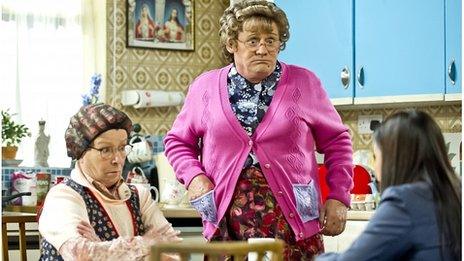
The appeal of Mrs Brown's Boys has spread around the globe
Q. Which British programmes go down well in New Zealand?
A. Bizarrely, Mrs Brown's Boys would be the most popular, and Miranda and Call the Midwife.
Q. How popular is Is British TV in New Zealand?
A. Over the last decade we've seen a decline in the number of English hours bought by New Zealand broadcasters. The mega years of American shows - the period dominated by Lost and Grey's Anatomy and The Sopranos - has meant a fundamental shift in viewing tastes.
It's tipped towards longer runs of drama and comedy. You could also say American television has got better. New Zealand audiences are exposed to television from all English language markets and the best idea wins out.
Q. What's the most popular show on New Zealand TV?
A. It's a long-running soap called Shortland Street. Think Coronation Street. Then the rest are big American dramas and comedies.
Tarmo Kivikiello, YLE, Finland
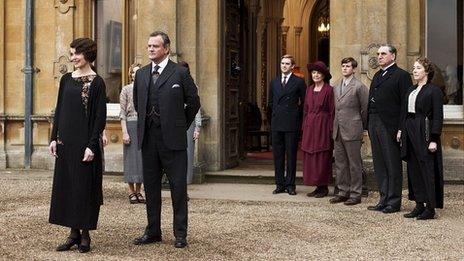
Downton Abbey has a big following in Finland
Q. What's number one in British TV in Finland?
A. It's definitely Downton Abbey. It's so huge in Finland. And also an old series called Heartbeat from ITV. We are making [showing] re-runs and the audience share is absolutely amazing. I don't know if it's the music or what, but there's something that really hits the Finnish audience.
Q. Do you have Doctor Who?
A. Doctor Who is funny because it's such a huge brand in Britain. We have tried. We bought the whole series and really pushed it but no, no reaction. There are a couple of fans and they really love it. But if you have 10 of those fans it's not enough.
Q. Is the taste for British TV changing?
A. It's quite stable. US programming is suffering at the moment. No matter how good US series you have, the figures are quite low. It's something I've discussed with my colleagues all over Europe and everybody's feeling somehow the same. We air Game of Thrones and Boardwalk Empire. They do have fans but when you compare it to Heartbeat, we get triple or more times [the audience for Heartbeat]. It's funny.
Anna Rozenvalde, LTV, Latvia
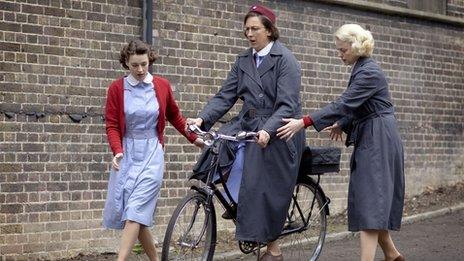
Call the Midwife was tricky to translate into Latvian
Q. Which British shows are on Latvian TV?
A. We buy natural history and science documentaries and also of course British drama. Young people love the very new and modern version of Sherlock. And the most popular drama shows are Call the Midwife, Father Brown and Parade's End.
Q. How do programme titles translate into Latvian?
A. With Call the Midwife, midwife means grandmother in Latvian. It was a bit complicated translating it. So [the Latvian title] is something like Invite the Midwife To Come.
Q. What's the most popular programme on Latvian TV?
It's Eurovision. And we bought the BBC format The Big Read, which is quite an old format but it's really at the right time for Latvian TV because Riga is cultural capital of Europe.
Meric Bilaceroglu, NTV, Turkey
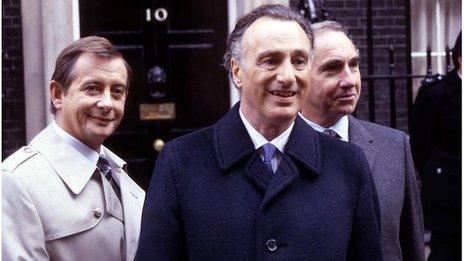
Yes Minister was a hit in Turkey
Q. Which British programmes do well in Turkey?
A. Documentaries, especially natural history, work pretty well for the Turkish audience. And UK drama and comedies, there are some classic examples like Upstairs, Downstairs, which was popular. Yes, Minister is the same. It was really funny for the Turkish audience.
We are the broadcaster of Doctor Who. According to social media ratings we are in fourth position in the world with the hugest fans of Doctor Who.
It's the same with Sherlock. Most of the audience is so angry that Sherlock doesn't have many episodes. Three episodes are not enough. We have to explain to our audience that this is how the BBC does it.
Q. Do you get British comedy?
A. We do but to be honest we are selective because you do have a different sense of humour, so sometimes we do have difficulty adapting and translating it into Turkish culture. But the classical ones and the ones that have proven their international success will work for Turkey as well.
Pierre Cheung, BBC Worldwide, China
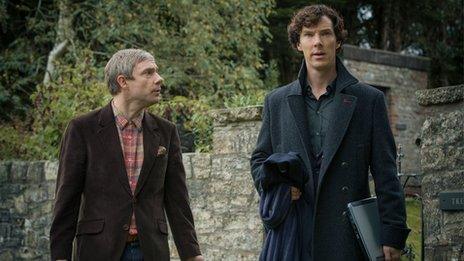
Sherlock and Dr Watson are known as Curly Fu and Peanut in China
Q. Is Doctor Who popular in China?
A. Last year we hosted a screening of Doctor Who and had a contest. A hundred fans won and came to our event. A lot of them dressed up. I remember one very young girl put make-up on her eyebrow to try to look like Matt Smith. That was the point where I thought, 'Oh wow. Fans are actually extremely serious about the brand.'
Q. Sherlock's a big deal isn't it?
A. Yes it's a huge success. We've just broadcast the third season and got 49 million hits. Benedict Cumberbatch is a huge star in China. They call him Curly Fu. There's a lot of attention on him and a lot of people are trying to get him to China. We're still trying.
Q. Is there any difference between a Chinese version of a programme like Strictly Come Dancing and the British original?
A. Yes there's some editorial differences and also technical choices. Like in the original format, you've got fewer episodes in the UK, but in China they want more celebrities and more people, so they add the number of couples to make it more entertaining.
Kate Dunaeva, TV3, Russia
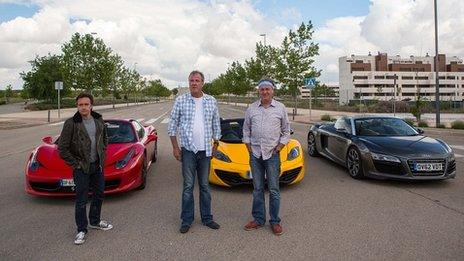
Top Gear went down well in Russia
Q. Which are the most popular British shows in Russia?
A. That's easy - Sherlock is a worldwide phenomenon and Russia is one of the biggest countries that really enjoys the show. That was aired on the biggest channel in Russia, Channel One. This year, the third series aired in Russia five minutes later than it aired here in Britain, an almost simultaneous broadcast.
Q. What do Russian people think of British TV?
A. Russians love Britain and British people and this content has a very specific image and particular sense in it. We love British classics and everything based on British culture. For example, Russians are huge fans of Arthur Conan Doyle and Sherlock Holmes.
At the same time, there are shows that are so creative and inventive, like the visual effects in Top Gear, which was popular in Russia as well.
Willard Gustavo Tressel, DirecTV PanAmerica (broadcasts in Venezuela, Argentina, Chile, Colombia and Puerto Rico)
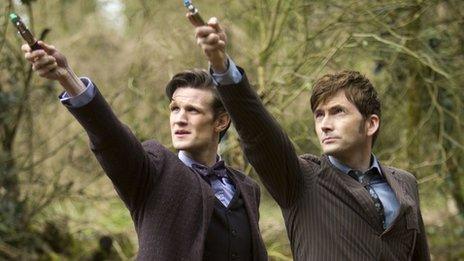
Doctor Who has a cult following in Latin America
Q. Which British programmes do you show?
A. I've got Doctor Who. Recently I've had Orphan Black, The Town, The Fear, documentaries and concerts.
Q. Is Doctor Who well known in Latin America?
A. It's widely known among a certain demographic. They're passionate, as you know. The ratings may not be as big as some of the mainstream scripted drama programmes that we have, but they're passionate and it's a good audience.
Q. Which types of British shows do best?
A. Scripted drama does particularly well and concerts do well. We had Glastonbury. We've had Coldplay and a David Bowie special. And I try to find documentaries about current events that are touching something in the lives of people in Latin America.
Interviews by BBC News media correspondent David Sillito and entertainment reporter Ian Youngs.
- Published28 January 2014
- Published8 October 2013
- Published2 October 2013
- Published18 September 2013
- Published9 May 2013